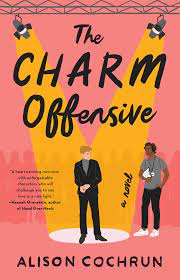By Alison Cochrun
(Atria, 2021)
I’ve watched too many seasons of both “The Bachelor” and “The Bachelorette.”
I will try to redeem myself by saying I’ve stopped. Haven’t watched for several years. I can thank Colton Underwood. He was a football player who never quite made the NFL and was a contestant on a season of “The Bachelorette” but ultimately got sent home in the rejection limo. Then they made him guy women would woo on “The Bachelor.” I bowed out. The guy was incredibly dull and I didn’t want to watch a whole season that would focus on the fact he was supposedly a virgin. As it turns out, he was gay.
Alison Cochrun’s The Charm Offensive is a gay romance set during a hetero-focused season of “The Bachelor.” Correction: a season of the fictional show “Ever After” which is different in name only plus a few cosmetic tweaks. Cochrun’s reality show plays up the fairy tale factor more blatantly with Charles Winshaw being the show’s Prince Charming who actually wears a crown to meet twenty prospective princesses. What’s shocking—SHOCKING!—is that Charlie hasn’t gone on the show to find love. He’s a wealthy tech genius who got booted from his own company and is trying to rebuild his reputation so he can re-enter the field.
Because geeky tech companies in the Silicon Valley seek hunky Prince Charmings. Surely that’s on the job posting for app creators and game designers. Maybe the way to take a chunk out of Facebook (or that stupid “Meta” rebrand) is to hire a figurehead who’s easier on the eyes than Mark Zuckerberg. It’s possible. I know nothing about tech.
The fact Charlie isn’t looking for love doesn’t sit well with Dev Deshpande, an “Ever After” producer assigned to manage its star. Dev’s been with the show for six years, having watched it since he was ten, fully enrapt with the idea that people can go on the show, fall in love and live happily ever after. Even though most of the relationships don’t last, Dev is still married to the idea that the show offers the potential of everlasting love. As the new season begins, Dev’s trying to build himself up again too, having recently ended his six-year relationship with Ryan, another producer on the show. Ryan had always said he wasn’t looking for longterm; Dev just chose to believe he could will his own ever-after onto them.
Charlie is an awkward reality star. He’s got the good looks—blond and impossibly handsome—but he can barely form a sentence under pressure and his OCD makes him reticent to human touch, a huge problem on a dating show with multiple women vying for his attention and affection.
The book becomes more implausible than the show upon which it’s based when Dev ends up working 24/7 by living in the same house as Charlie. (What kind of employment contract did Dev sign?) Jules, Dev’s best friend who also works on the show, suggests that Dev get Charlie to relax more on the filmed dates with the women contestants by taking Charlie on practice dates—not between Jules and Charlie, but between Dev and Charlie.
Um, what?
Charlie goes along with it because, well, isn’t that what any ridiculously good-looking straight guy in his late twenties will agree to do so he can improve upon dating women whom he’s not really interested in falling in love with?
Are you following? If it seems nonsensical then, yes, you’re following.
Just go with it. I managed to. I’m telling myself it’s because reading The Charm Offensive was my way of getting another taste of “The Bachelor” without committing to a whole maddening season of cat fights, limo cries and icky Fantasy Suite dates where we’re led to believe the guy has three consecutive nights of sex with the final three women. God, I really watched that show. Season after season. And somehow it made me believe in the possibility of love. Shame on me.
Cochrun’s Charlie has anxiety in addition to OCD. He’s also not sure about his sexuality and parts of his journey to figuring that out feel like information dumping as possibilities are explained to him (and the reader). It didn’t bug me since Cochrun chose to bring something different to the romance genre. She ups things by making it so that Dev also deals with mental health issues. Being as I have mental health challenges too, I welcome seeing this in the main characters instead of in a supporting character. (The story progresses in alternating chapters, told in third person, from Dev’s point of view and then Charlie’s point of view.)
Cochrun takes liberties from reality in having every “Ever After” staff member be queer other than its creator. All the queer employees have something good about them. The straight character is a villain. I never got a feel for any of the supporting characters. I expected Dev’s ex to have more of a storyline, playing on the inherently awkward circumstance of Dev and Ryan continuing to work together after a not-so-great breakup. Ryan is only used to advance the plot instead of to create conflict. This felt like a wasted opportunity. The story, as written, is all about Charlie and Dev.
You can guess how things go. It’s a gay romance, folks. Happily ever after is how these stories have to end. Knowing this, it felt like the story went on longer than it needed to. Cochrun had to stick with the show’s structure, with the group of twenty women getting narrowed down to one over two months’ time. Connections happened too soon and the ensuing barriers, miscommunications and jealousies seemed trivial. There’s nothing particularly wrong with The Charm Offensive; I just wanted to get to the predictable ending fifty pages sooner.
The book is better than “The Bachelor” because it’s willing to acknowledge that a dating show about finding love may not actually be about finding love. Stick with romance books instead.


